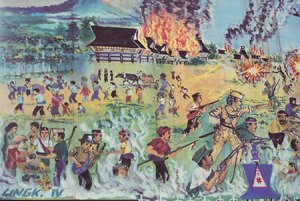Presented By: Center for Southeast Asian Studies
Eating an Elephant, Imagining a Community: Alimentary Nationalism and the Memory of the Senses
CSEAS Noon Lecture Series

Speaker: Mary Steedly, Professor of Anthropology, Harvard University
On August 17, 1945, Indonesia proclaimed its independence from Dutch colonial rule. Five years of diplomatic negotiation and sporadic armed struggle ensued. This was a time of aspiration, mobilization, and violence, in which Indonesian nationalists fought to expel the Dutch while also attempting to come to grips with the meaning of “independence.” In the rural highlands of northern Sumatra, the rural villages and towns of Karoland were in the thick of the action. Karo youths joined military and paramilitary forces; farmers donated cash and crops to the cause of independence; girls worked in public kitchens preparing food for the soldiers, trained as first aid workers and as a military reserve, and served in a myriad of other informal ways to support the nationalist cause. In 1947 many Karo villages were burned and virtually the entire population fled as the Dutch army advanced through the Sumatran highlands. The evacuees remained in forest camps and field huts for as much as six months, until a temporary ceasefire allowed them to return to their devastated homes. There they continued to support a guerrilla struggle until December 1949, when an internationally negotiated treaty acknowledging Indonesian national sovereignty was accepted by the combatants.
Karo today regard the independence struggle as an iconic moment in their move to modernity, and they see their role in it as a demonstration of the magnitude of their sacrifice for the nation, but it is not entirely clear what Karo villagers thought they were fighting for at the time. Why did they want to take part in the struggle for independence? What did independence mean to them? How did they conceive of the nation and their place within it? Based on interviews and conversations conducted in North Sumatra between 1993 and 1995 with former veterans of the struggle, this talk approaches Karo engagements with nationalism and independence via a subset of narratives that demonstrate what I – somewhat playfully – refer to as “alimentary nationalism”: that is, stories that use food as an idiom to communicate, display, disturb, or limit the extent of national belonging or communal imagining.
Mary Margaret Steedly (PhD ‘89, University of Michigan) is a professor of social anthropology at Harvard University. She has focused her research on the Karo Bataks, a kinship-based society of North Sumatra deeply implicated in colonial and postcolonial projects of modernity, development, and nation-building of the Indonesian state. Her first book, Hanging without a Rope: Narrative Experience in Colonial and Postcolonial Karoland (1993) won the Victor Turner Prize for Ethnographic Writing in 1994. Her new book, Rifle Reports: Gender, Nationalism and Peasant Resistance in the Karo Area, 1945-1950, was published last year.
On August 17, 1945, Indonesia proclaimed its independence from Dutch colonial rule. Five years of diplomatic negotiation and sporadic armed struggle ensued. This was a time of aspiration, mobilization, and violence, in which Indonesian nationalists fought to expel the Dutch while also attempting to come to grips with the meaning of “independence.” In the rural highlands of northern Sumatra, the rural villages and towns of Karoland were in the thick of the action. Karo youths joined military and paramilitary forces; farmers donated cash and crops to the cause of independence; girls worked in public kitchens preparing food for the soldiers, trained as first aid workers and as a military reserve, and served in a myriad of other informal ways to support the nationalist cause. In 1947 many Karo villages were burned and virtually the entire population fled as the Dutch army advanced through the Sumatran highlands. The evacuees remained in forest camps and field huts for as much as six months, until a temporary ceasefire allowed them to return to their devastated homes. There they continued to support a guerrilla struggle until December 1949, when an internationally negotiated treaty acknowledging Indonesian national sovereignty was accepted by the combatants.
Karo today regard the independence struggle as an iconic moment in their move to modernity, and they see their role in it as a demonstration of the magnitude of their sacrifice for the nation, but it is not entirely clear what Karo villagers thought they were fighting for at the time. Why did they want to take part in the struggle for independence? What did independence mean to them? How did they conceive of the nation and their place within it? Based on interviews and conversations conducted in North Sumatra between 1993 and 1995 with former veterans of the struggle, this talk approaches Karo engagements with nationalism and independence via a subset of narratives that demonstrate what I – somewhat playfully – refer to as “alimentary nationalism”: that is, stories that use food as an idiom to communicate, display, disturb, or limit the extent of national belonging or communal imagining.
Mary Margaret Steedly (PhD ‘89, University of Michigan) is a professor of social anthropology at Harvard University. She has focused her research on the Karo Bataks, a kinship-based society of North Sumatra deeply implicated in colonial and postcolonial projects of modernity, development, and nation-building of the Indonesian state. Her first book, Hanging without a Rope: Narrative Experience in Colonial and Postcolonial Karoland (1993) won the Victor Turner Prize for Ethnographic Writing in 1994. Her new book, Rifle Reports: Gender, Nationalism and Peasant Resistance in the Karo Area, 1945-1950, was published last year.